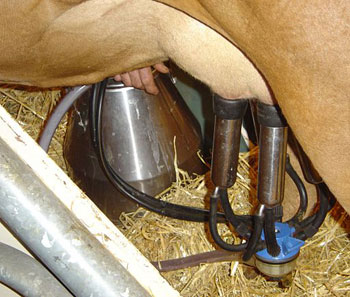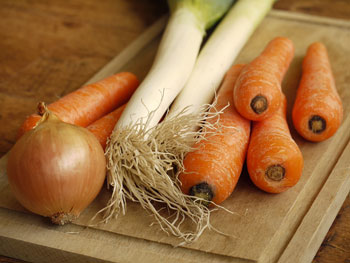
GOD BLESS THE U.S. Food and Drug Administration (FDA). They have done much to safeguard our food supply, and they are on the front lines, helping to prevent food-borne illness. At Stockton Aloe 1, we appreciate the FDA’s goal of ensuring food safety, and we strive to know and adhere to FDA guidelines.
After all, we care about you … naturally.
There are times, though, when natural health practices and the FDA butt heads – and one bone of contention is the debate concerning raw foods versus pasteurization.
Why pasteurize?
The process of pasteurization is fairly simple: products are heated to recommended temperatures for prescribed times in order to kill potentially harmful pathogens. You may, for instance, be affected by a natural disaster and need to boil tap water for several minutes before drinking it. That is an often-used process for the home pasteurization of drinking water.
Those who produce large quantities of pasteurized foods work with huge vats and elaborate mechanisms to ensure the temperature and timing are correct, but the principles are consistent: elevate the temperature for a set amount of time, and the germs are destroyed.
Why not pasteurize?
Think of pasteurization as a kind of preemptive antibiotic – it doesn’t kill potentially dangerous organisms only, but wipes out every living organism it finds. The problem with that scattershot approach is that there are normally many more helpful or non-threatening bacteria present in or on natural foods than there are bad ones.
Incredibly, several pounds of the average adult’s body weight are made up of beneficial bacteria. Without them, your system would be in big trouble. The term most often used to describe the friendly organisms your body needs is “probiotics” (as opposed to antibiotics). Pasteurization, then, is a real and important case of “don’t throw the baby out with the bath water.” Probiotics are good for you.
 What does Science say?
What does Science say?
Researchers still can’t agree over whether or not you should eat eggs for breakfast – so it is not surprising there is no consensus over pasteurization either. Some scientists believe it is a necessary and vital practice. Others point to the destruction of the good bacteria along with the bad.
The real catch-point in the picture is that proper handling and preparation of foods renders pasteurization relatively unnecessary. There will always be situations where a pathogen escapes detection – be it a salmonella outbreak at an otherwise popular and trusted restaurant or a contaminated shipment of cucumbers that sickens people across an entire region.
In almost all cases, though, investigators eventually arrive at a point where they find the cause centered on human error. As is the case with allopathic medicine, the tendency is to treat the symptoms, not the problem. Rather than focus on better food handling procedures, the preferred treatment is to pasteurize or cook all foods before eating.
There is one more crucial consideration, though – one we seldom hear much about: when the focus is on end treatment, rather than on proper practices throughout the food production cycle, food producers can ease up on handling procedures, introducing further contamination.
Some have even claimed, for instance, that “Pasteurized dairy is produced in the dirtiest milk factories imaginable.” That may be a severe criticism, but one thing is certain: a system dependent upon a final treatment to be the cure-all solution is a system bound to develop procedural lapses.
Which is better – raw food or pasteurized food?
From a food safety standpoint, cooking is a form of pasteurization. Both elevate the temperature of foods in order to destroy bacteria. Of course, there is an added factor for cooking – it affects the taste and texture of the meal. Leaving issues of taste aside, however, and considering the topic from the standpoint of health only, which should you choose – raw foods or pasteurized foods?
At Stockton Aloe 1, we believe in the exceptional value of whole, raw foods. For us, the more modification or additives foods need for the marketplace, the less potent will the end product be. There may be exceptions to that rule – but, in our experience, Aloe vera is not one of them.
You may have noticed that our products carry the FDA-mandated notification, “WARNING: This product has not been pasteurized …”, and for some customers that can be a worrisome prospect – yet the primary reason so many health-conscious individuals turn to Stockton Aloe 1 products is because they know our gel comes from 100% pure, hand-filleted Aloe vera that is free of preservatives and contains the maximum amount nutritive value. Our gel is quickly frozen to preserve freshness.
We are committed to producing products that actually deliver the nutrition benefits you seek, so we choose to make sure our crops are treated right, from planting to harvest and processing, rather than to depend on pasteurization as a means of covering up poor procedures or as a way to help ensure the product can sit on a grocery store shelf for months or years without rotting.
How can one decide?
 Often, when confronted with a dilemma, we look to the possible ramifications. Benjamin Franklin popularized Plato’s “pros and cons method” of decision-making. Others find the task of making a list of contingencies too labor intensive and time consuming. Today’s information onslaught, they say, requires a streamlined method, one that considers the important factors only.
Often, when confronted with a dilemma, we look to the possible ramifications. Benjamin Franklin popularized Plato’s “pros and cons method” of decision-making. Others find the task of making a list of contingencies too labor intensive and time consuming. Today’s information onslaught, they say, requires a streamlined method, one that considers the important factors only.
In the raw versus pasteurized dilemma, your health is at stake. This is a decision that can have far-reaching consequences. From Maximilian Bircher-Benner’s pioneering work with healing and raw foods to Jordan Rubin’s insistence that raw foods can “transform your life,” proponents say a diet rich in raw foods can restore lost health and improve your life dramatically.
On the other hand, we hear about FDA-led raids on stores selling raw foods, with people being deemed felons for dealing in raw foods – and we wonder whether there must some major reason for concern. Certainly, our government can’t be positioning itself to force us to eat “officially sanctioned” foods only. Shouldn’t ones diet be a matter of personal preference, and not a federal issue?
Let’s go deeper
In the next article in this series, we will consider the topic from both Franklin’s perspective and the “let’s cut to the chase” method. Going even further, we will talk about foods many people enjoy, but often know little about: cultured vegetables.
We are aware this is a hotly debated issue. Our desire is not to stir up further controversy – but to weigh the evidence and help one another understand something that may have tremendous impact on your health: should you seek raw foods or should you shun them?
Your comments and observations are encouraged and appreciated.
Doctor Michael Haley


Just wondering if sashimi is safe. I am not this health conscious person but when I read your article it made me think that even raw eggs which I eat might not be safe too. Thank for this wtite up. Such a great help to all who are not aware of how safe the food we eat. 😀
I have a friend who is a raw foodist… only he eats mostly animal foods including chicken, fish, beef, and even organ meats. He feels that the foods are safe if they were healthy animals raised properly and fed the correct diet. Although some of his food choices are not for me, I think he may be right. However, the possibility exists that even properly raised animal foods may be contaminated and contain dangerous bacteria and parasites.
Unpasteurized juices may also contain harmful bacteria. But pasteurized beverages may also get contaminated post pasteurization which in some cases can be worse since they no longer have their natural beneficial flora to protect them.
The point is, there are certainly times that raw is much better for you and there are times that cooking and pasteurizing makes something safer… though the food may be damaged in the process.